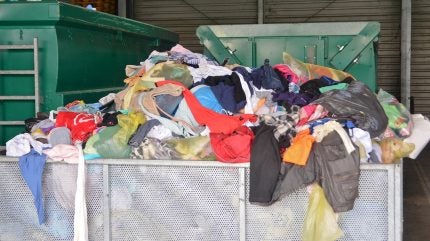
The report, developed by Oxford Economics, details the societal and financial implications of the initiative, which would feature three automatic textile sorting plants (ATSPs) and a chemical recycling facility in the UK.
The ATSPs are proposed to be distributed across the UK in the East Midlands, North West, and South West regions, while the chemical recycling plant is slated for development in the East Midlands.

Discover B2B Marketing That Performs
Combine business intelligence and editorial excellence to reach engaged professionals across 36 leading media platforms.
The ATSPs will be equipped with automated systems for sorting textile waste by fibre type and quality.
The chemical recycling facility will facilitate closed-loop recycling processes for polyester and possibly other synthetic fibres.
At full capacity, the three sorting facilities are projected to reroute around 150,000 tonnes (t) of textile waste from landfills and incineration each year.
Of this diverted waste, 50,000t would be chemically recycled into new clothing fibres, while the remaining 100,000t would be repurposed through other textile recycling methods.

US Tariffs are shifting - will you react or anticipate?
Don’t let policy changes catch you off guard. Stay proactive with real-time data and expert analysis.
By GlobalDataThe UK currently discards roughly one million tonnes of used textiles annually, with a third deemed non-rewearable and ending up in landfills, incineration, or being exported.
This disposal costs the country an estimated £200m per year.
The report suggests that the new hub could cut these expenses by over £24m annually by reducing landfill and incineration fees.
The hub’s development phase is set to begin in 2025 and continue until 2028.
The chemical recycling plant is expected to start operations in phases in tandem with the ATSPs, aiming for full operational status by 2031.
The UKFT expects the creation of the hub to generate 220 direct job years during its construction phase, with an additional 400 job years when considering indirect and induced employment effects.
This investment could contribute £46m to the gross value added (GVA) during its three-year construction phase, with £20m directly from the development of the sites.
Once fully operational, it’s estimated that the hub could sustain 720 jobs and add approximately £53m annually to the GDP.
This report is part of the Circular Fashion Innovation Network (CFIN) initiative, spearheaded by UKFT and the British Fashion Council (BFC), in collaboration with UK Research and Innovation (UKRI).
CFIN concentrates on six key areas such as recycling infrastructure and sustainable manufacturing. It operates alongside the ACT UK project led by UKFT, which seeks to create a working model for an ATSP within the UK.
In March this year, the UKFT introduced a new membership category to support circularity, growth and innovation within the UK’s fashion and textile industry.





